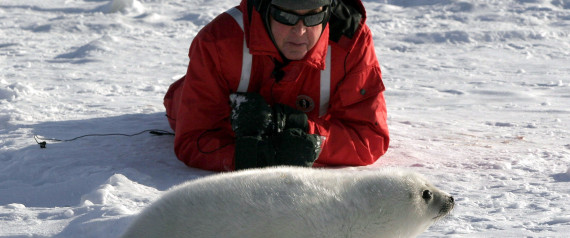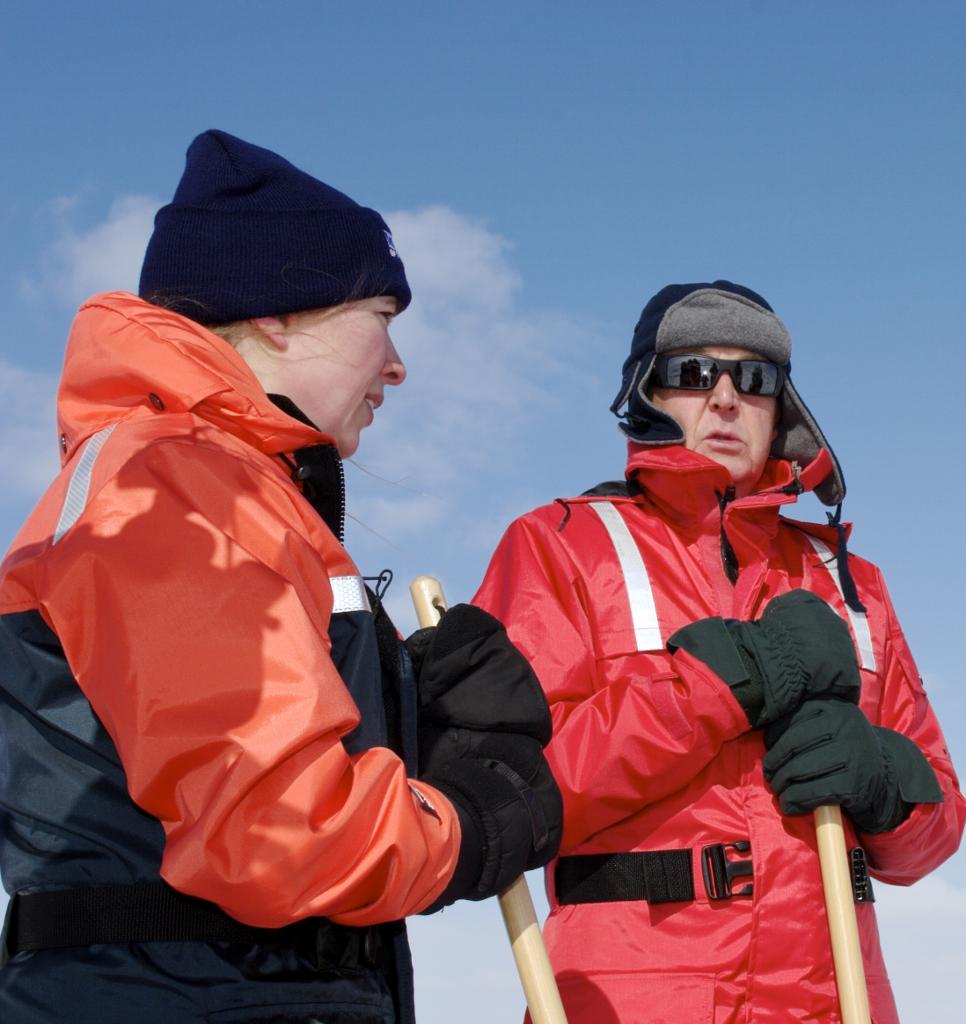Paul McCartney weighs in on seal hunt again
By Sue Bailey
The Canadian Press
April 14, 2015
ST. JOHN’S, N.L. – Former Beatles frontman Paul McCartney is calling again for an end to Canada’s East Coast commercial seal hunt, roiling supporters who say it’s a humane source of cash for struggling outports.
McCartney appeals for a stop to what he calls a “senseless slaughter” in a statement released Tuesday by Humane Society International. The group plans to document the hunt on film as it has for years.
“Their videos of the bloody seal slaughter provide the only vital evidence to demonstrate year after year that these seals are dying a horrible death for their fur,” McCartney said.
Anti-sealing campaigns have helped inspire bans on seal product imports in the European Union, the United States, Mexico and other countries.
The hunt opened Sunday on the Front off northeastern Newfoundland and southern Labrador, as well as in the Gulf of St. Lawrence.
It has dwindled in recent years with fewer than 55,000 harp seals landed last year compared to a federal quota of about 400,000. Hunters were urged to ensure they have a buyer before heading out.
Eldred Woodford, president of the Canadian Sealers Association, said he won’t be going to the ice for the first time in 20 years. That’s because just one buyer so far has indicated demand for 30,000 harp seal pelts, he said from Twillingate, about six hours north of St. John’s.
“It’s a very limited hunt this year.”
The federal government set the allowable catch at 400,000 harp seals, 60,000 grey seals and 8,000 hooded seals.
Woodford stressed that at about $35 each for the highest quality pelts last year, sealing provided a crucial boost.
“It’s very important to smaller rural communities, coastal communities, which need every little bit of income they can get.”
The hunt is also increasingly needed as a check on growing seal populations that feast on fragile fish stocks, Woodford said.
Jeffrey Hutchings, a biologist at Dalhousie University in Halifax, said in a recent interview that harp seal numbers have soared in the last 20 years.
“There is an imbalance, if you will, between predator and prey and it would not be surprising if the seals were having some impact on the recovery of cod. But the data really are not very clear in that regard.”
The federal government has defended the commercial seal hunt as humane and sustainable.
“We continue to tell the truth about sealing, and the effects of seal populations on our marine ecosystems, to combat misleading attacks on the hunt from radical animal rights activists,” Fisheries Minister Gail Shea said Tuesday in a statement. She was not available for an interview.
“We’ve challenged the EU’s unfair ban on Canadian seal products, and are working with industry and our international partners to develop new products and open new markets.”
McCartney made international headlines in 2006 when he staged a photo-op on the ice floes in the Gulf of St. Lawrence, beseeching Canada to halt the centuries-old hunt.
Terry Audla, president of Inuit Tapiriit Kanatami representing about 55,000 Canadian Inuit, said in a statement that McCartney should stick to what he knows.
“He is perpetuating myths, disregarding science and traditions, and turning a blind eye to the needs of working people to earn a living and feed their families.”

Paul McCartney and his wife Heather pose with a seal pup on the ice floes off Iles de la Madeleine in the Gulf of St.Lawrence, Thursday, March 2, 2006, as part of a high-profile protest against Canada's annual seal hunt. McCartney is once again calling for an end to the commercial seal hunt off Canada's East Coast. THE CANADIAN PRESS/Tom Hanson
www.hsi.org
Sir Paul McCartney Calls for an End to Canada’s Brutal Commercial Seal Hunt
Humane Society International on location to film the killing to protect vital EU trade ban
Humane Society International/Canada
April 14, 2015
Sir Paul McCartney has issued an impassioned appeal for an end to the senseless slaughter of baby harp seals taking place off Canada’s east coast. The Canadian government has authorized the killing of up to 468,000 harp, hooded and grey seals. The seals—almost all just a few weeks of age—are shot, clubbed and skinned for their fur despite dwindling global demand for seal products. Humane Society International is the only organization on the scene to bear witness to the 2015 commercial seal hunt.
McCartney said: "Canada's brutal commercial seal hunt has begun, and once again thousands of baby seals will be shot and bludgeoned to make fur products that nobody wants or needs. The European Union's trade ban on commercial seal hunt products has already helped save more than one million baby seals from a horrible fate. But we need to ensure the EU keeps this strong ban intact. That's why my friends at Humane Society International are once again setting out for the ice flows for the grim task of catching this horror on film. Their videos of the bloody seal slaughter provide the only vital evidence to demonstrate year after year that these seals are dying a horrible death for their fur. As HSI bears witness to this cruelty, I wish them well and hope that this will be the last year that Canada's ice turns red."
The iconic musician, who visited the harp seal nursery with HSI in 2006, is also highlighting the importance of maintaining a strong European Union ban on commercial seal product trade. Following public outcry at the animal suffering, the EU banned trade in products of commercial seal hunts in 2009. While the World Trade Organization has twice upheld the EU’s right to ban this trade, the EU must now tweak the Regulation to bring it into compliance with international trade requirements.
Rebecca Aldworth, executive director of HSI/Canada, said: “This will be the 17th year that I have witnessed the seal slaughter. The suffering I have seen is impossible to forget. These baby animals are dying a violent death for fur products that nobody is buying. If the killing happened in view of the public, it would have been shut down decades ago. But it occurs far offshore, and that is why it is so important that HSI is here to film what happens. HSI is committed to protecting these seals and we won’t stop until peace is restored to the ice floes.”
Global markets for seal products are closing fast. The EU, the United States, Switzerland, Mexico, Taiwan and the Customs Union of Russia, Belarus, Kazakhstan and Armenia have all stopped their trade in some or all products of commercial seal hunts. Chinese authorities have also blocked attempts to import seal meat into China. This has caused a dramatic decline in prices for seal products in Canada, convincing most sealers not to participate in the slaughter and sparing more than one million seal pups from a horrible fate.
Facts:
The 2009 European Union ban on trade in products of commercial seal hunts contains a clear exemption for products of traditional Inuit sealing.
HSI does not oppose Inuit subsistence sealing. Our campaign seeks to end the industrial scale, commercial slaughter of baby seals for their fur in Atlantic Canada.
Canadian government reports confirm that more than 98 percent of seals killed in Canada’s annual slaughter are less than three months of age.
Veterinary reports consistently reveal high levels of animal suffering in commercial sealing, and leading veterinary experts have concluded that Canada’s commercial slaughter is inherently inhumane.
Evidence gathered every year by HSI shows that many seals suffer considerably, including conscious pups impaled on steel hooks, dragged across the ice and cut open, and wounded seals left to suffer in agony and escape beneath the water’s surface, where they die slowly. HSI footage has played a vital role in convincing nations to stop their trade in seal products.
National polling consistently shows most Canadians want the commercial seal slaughter to end, and oppose the Canadian government using tax dollars to promote the sealing industry.
Polling shows half of Newfoundland sealers and the majority of Newfoundlanders, holding an opinion, support a federal sealing industry buyout (Ipsos Reid 2010).
Media contact: Christopher Paré - 514 395-2914, cpare@hsi.org

Sir Paul McCartney and HSI/Canada's Rebecca Aldworth during Seal Watch 2006 in the Gulf of Saint Lawrence. Rolf Hicker
quebec.huffingtonpost.ca
Paul McCartney demande l'arrêt de la chasse au phoque sur la côte est du Canada
PC | Par La Presse Canadienne
Publication: 14/04/2015
Paul McCartney demande une fois de plus l'arrêt de la chasse commerciale au phoque sur la côte est du Canada.
M. McCartney considère cette pratique comme «un massacre insensé», dans une déclaration publiée par l'organisation Humane Society International (HSI).
Les campagnes contre la chasse au phoque ont contribué à faire pression sur l'Union européenne, les États-Unis, le Mexique et plusieurs autres pays pour qu'ils interdisent les produits à base de phoque.
La chasse a commencé dimanche au large de l'île de Terre-Neuve et au sud du Labrador, mais également dans le golfe du Saint-Laurent.
La chasse au phoque a toutefois diminué au cours des dernières années. Seulement 55 000 phoques ont été capturés l'an dernier, alors que le gouvernement fédéral établit son quota à 400 000.
Le gouvernement du Canada défend la chasse commerciale au phoque en soutenant que cette pratique est humaine et suffisamment réglementée.
Paul McCartney avait fait les manchettes en 2006 lorsqu'il avait orchestré une séance photo le montrant sur les banquises du golfe du Saint-Laurent, demandant l'arrêt de cette pratique qui perdure depuis des siècles.

Paul McCartney visits with a newborn harp seal pup on the ice floes of the Gulf of St. Lawrence on Canada's Atlantic Coast Thursday, March 2, 2006. The McCartney's came to Prince Edward Island to support the efforts of the Humane Society International and Respect for Animals, both of which are demanding the end of the annual hunt. (AP Photo/Christopher Brown) | CHRISTOPHER BROWN/AP

Paul McCartney demande l'arrêt de la chasse au #phoque sur la côte est du #Canada

No hay comentarios:
Publicar un comentario